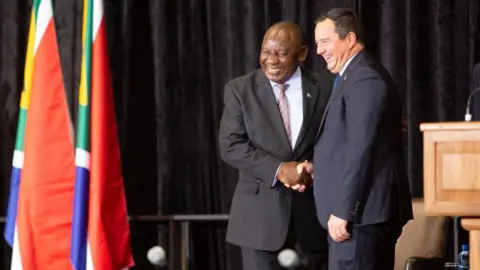South Africa’s Fragile Coalition: An Unbreakable Alliance
In the complex world of South African politics, a tense yet reluctant partnership exists between two of its largest parties: the African National Congress (ANC) and the Democratic Alliance (DA). This coalition, known as the Government of National Unity (GNU), is increasingly strained, but both parties seem unwilling to dissolve the alliance, fearing that separation could bring greater harm to their political fortunes and their constituents.
The GNU came into being following last year’s elections when the ANC, historically the party that ushered in democracy in South Africa under Nelson Mandela in 1994, lost its parliamentary majority. In an unexpected twist, the pro-business DA joined forces with the ANC, forming a coalition. As they celebrate their first year together, the partnership has been marred by disagreements rather than jubilation.
A Public Display of Discontent
Recent events have underscored the friction within this partnership. Following President Cyril Ramaphosa’s dismissal of DA member Andrew Whitfield from his role as deputy minister, tensions reached new heights. Whitfield’s firing was interpreted as a fundamental breach of trust and ignited a passionate response from DA leader John Steenhuisen, who voiced his grievances at a press conference. Among his concerns were Ramaphosa’s unilateral moves on controversial legislative issues without consulting the coalition partners.
Steenhuisen’s remarks highlight more than just personal grievances; they reflect a broader discord regarding policies believed to be detrimental to economic growth. The proposed Expropriation Act, which allows the state to seize land without compensation, has drawn criticism not only from the DA but also from South Africa’s trading partners, causing significant international backlash.
Strained Relationships and Competing Agendas
The relationship between the ANC and DA has been characterized by constant push and pull. Political analysts speculate whether either party will genuinely adapt their ideologies. The ANC persists in advocating for transformative policies, while the DA consistently challenges these measures. Dr. Levy Ndou from the Tshwane University of Technology encapsulates this ongoing struggle: “The constant desire for change from the ANC clashes with the DA’s pushback strategies, creating a perpetual source of discord.”
Both sides are well aware that their political survival may hinge on this seemingly toxic union. The DA recognizes that a split could allow radical factions like the Economic Freedom Fighters (EFF) to grow stronger, which would complicate an already delicate political landscape. Simultaneously, Ramaphosa’s administration has a vested interest in maintaining stability, given economic pressures and external expectations from the business community.
| Political Party | Leader | Key Issues |
|---|---|---|
| African National Congress (ANC) | Cyril Ramaphosa | Transformation Agenda, Land Expropriation |
| Democratic Alliance (DA) | John Steenhuisen | Economic Growth, Anti-Corruption |
The Path Ahead
As South Africa stands on the brink of local government elections, the political landscape’s fragility remains evident. Steenhuisen has hinted at a possible motion of no confidence against Ramaphosa, signaling an erosion of trust. Meanwhile, Ramaphosa appears to be navigating these troubled waters cautiously, wary of sparking a divorce that could prompt voter backlash.
In their pursuit of stability, both parties must find common ground and engage in constructive dialogue, free from the theatrics of political broadcasts. As they work through their disputes, the primary focus should return to addressing the needs and expectations of South African citizens, the true beneficiaries of this contentious coalition.


